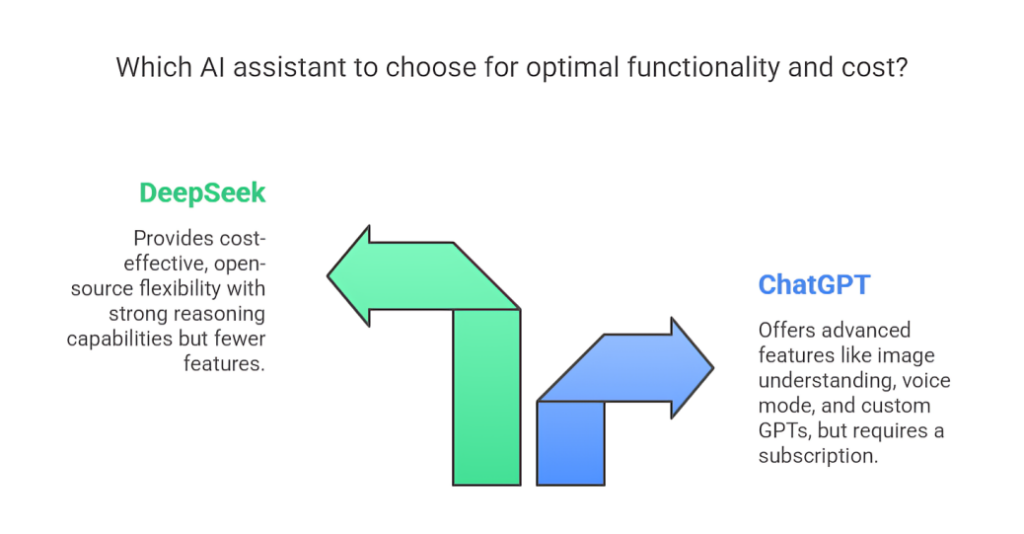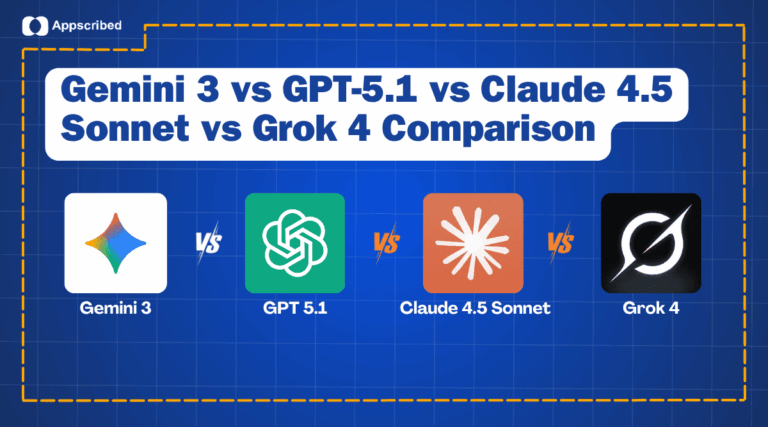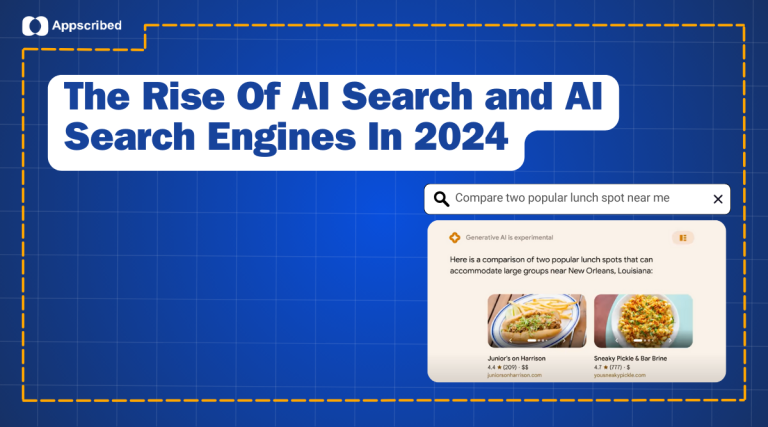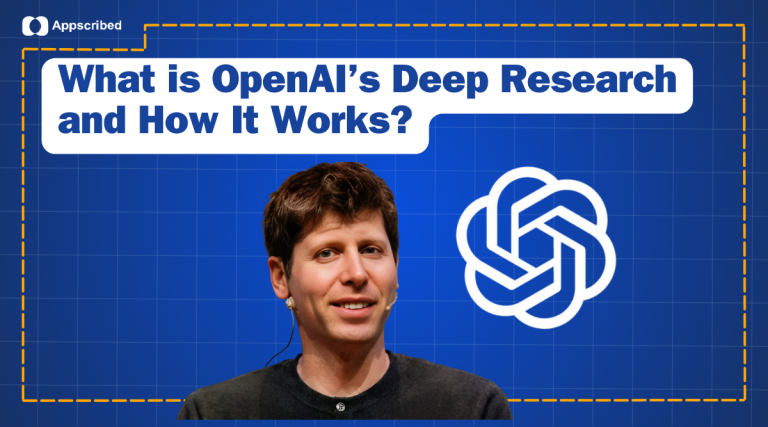Since its launch in 2022, ChatGPT has dominated the AI chatbot space. It has set a high standard for natural language processing and multimodal capabilities. However, DeepSeek has quickly gained international attention with its DeepSeek R1 model. Deepseek claims to rival OpenAI’s offerings while being significantly more cost-effective.
But how does DeepSeek truly compare to ChatGPT? Is it the best alternative or just another competitor in an increasingly crowded field?
Here, we break down the key differences between these two AI tools, covering their strengths, weaknesses, and best use cases. By the end of it, you will get a fair idea about which tool is best suited for you.
Overview: DeepSeek vs ChatGPT
DeepSeek
DeepSeek was developed by Liang Wenfeng, a finance and technology entrepreneur. It was released in 2025 and became one of the most downloaded AI applications globally. DeepSeek R1 is designed to perform complex reasoning tasks, including advanced mathematics and coding, at a fraction of the cost required to develop similar models like OpenAI’s GPT-4.
Key Features of DeepSeek R1:
- Uses Mixture-of-Experts (MoE) architecture, which allows it to activate only the necessary parameters for each query, making it highly efficient.
- Deepseek is optimized for technical problem-solving, including mathematics and programming.
- Reportedly trained with lower computational costs, reducing AI training expenses.
ChatGPT
OpenAI’s ChatGPT, powered by the GPT-4, GPT-4-turbo and OpenAI’s o1 series models, remains the most widely used AI chatbot. It performs extremely well in conversational ability, creative writing, and user experience. OpenAI has invested heavily in developing AI models that balance performance with ethical AI governance and privacy regulations.
Key Features of ChatGPT:
- Uses a dense transformer model, meaning all parameters are engaged during inference, ensuring high accuracy in language tasks.
- Excels in conversational AI, producing responses that mimic human-like dialogue more naturally.
- Integrates safety measures and regulatory compliance to align with data protection laws in the US and Europe.
Suggested read: Best AI Tools for Students
DeepSeek vs ChatGPT: Key Differences
| Feature | DeepSeek R1 | OpenAI’s ChatGPT |
|---|---|---|
| Model Type | Mixture-of-Experts (MoE) | Dense Transformer Model |
| Performance Focus | Mathematics, coding, efficiency | Natural conversation, general-purpose AI |
| Cost of Training | $6 million | Over $100 million |
| Subscription Cost | Free | Free (GPT-3.5) / $20 per month (GPT-4) |
| Computational Efficiency | Uses fewer resources per query | Higher resource consumption |
| Privacy & Security | Stores data on China-based servers | Follows US and EU data protection regulations |
| Customization | Open-source, allows modification | Limited customization options |

DeepSeek R1 vs. ChatGPT: Use Cases
ChatGPT (GPT-4o) is Ideal For:
- Creative Professionals – Writers, marketers, and content creators who need AI-generated articles, blogs, ads, and storytelling can
- General Conversational AI – Excels in human-like conversation, summarization, and customer support.
- Multimodal Tasks – Can process images, voice, and text, making it superior for data interpretation, live vision, and visual-based problem-solving.
- Business & Productivity – Supports scheduled tasks, project organization, and automation through integrations like Zapier.
- Custom AI Solutions – Users can create Custom GPTs to personalize AI behavior for specific needs.
DeepSeek R1 is Ideal For:
- STEM Researchers & Coders – Optimized for mathematics, logic-based reasoning, and advanced coding tasks.
- Cost-Conscious Users – Free access with fewer restrictions compared to ChatGPT’s paywalled features.
- Developers & AI Enthusiasts – It offers open-source customization for those wanting to modify and run AI models on private servers.
- Enterprise & Private AI – Businesses looking for data control and self-hosted AI solutions will benefit from DeepSeek’s open access.
- Technical Academic Use – High accuracy in math, science, and problem-solving benchmarks makes it useful for researchers.

Pricing and Availability
| Model | Cost per Million Input Tokens | Cost per Million Output Tokens |
| ChatGPT (GPT-4o) | $5.00 | $15.00 |
| ChatGPT-4o Mini | $3.00 | $12.00 |
| DeepSeek R1 | Free (for now) | Free (for now) |
DeepSeek R1 vs. ChatGPT (GPT-4o) – Pros & Cons
Understanding the strengths and limitations of each AI model can help you make the right choice. Here is a comparison of both tools based on their pros and cons.
Pros of DeepSeek R1
- Free and open-source – Cost-effective, making it accessible to a wide range of users.
- Efficient for coding and math – Excels in structured problem-solving with high accuracy.
- Faster for structured queries – Optimized for logical reasoning and technical tasks.
- Customizable – Ideal for developers and researchers who want greater control.
- Lower resource requirements – More efficient compared to traditional models.
Cons of DeepSeek R1
- Lacks multimodal capabilities – Does not support image or voice processing.
- Not as conversational – Responses can feel rigid compared to ChatGPT.
- Requires technical expertise – Setup and customization can be complex.
- Less intuitive for non-technical users – Steeper learning curve for casual users.
Pros of ChatGPT (GPT-4o)
- Strong contextual understanding – Excels in natural conversation and nuanced responses.
- Reliable for general research and writing – Well-rounded performance across multiple domains.
- Better multimodal integration – Supports text, images, and voice processing.
- User-friendly interface – Easy to use for both beginners and professionals.
- Consistent performance – Works well across various tasks, ensuring reliability.
Cons of ChatGPT (GPT-4o)
- Subscription required for premium access – Free tier has limitations.
- Higher computational costs – It is more expensive, especially for enterprise use.
- Limited free usage – Message restrictions on unpaid plans.
- Can be slower for structured, technical queries – May not match DeepSeek’s efficiency in math and logic-heavy tasks.

Which AI Should You Use?
Choosing between DeepSeek and ChatGPT (GPT-4o) depends on your specific needs. Let’s break down which AI model is best suited for different types of users.
DeepSeek Would Be the Best Option for You If:
- Your primary focus is coding, mathematics, and structured problem-solving.
- You need an AI with strong STEM capabilities, especially for tasks involving complex computations and logic-based queries.
- You prefer an open-source model that allows for customization and integration into technical workflows.
- You want a cost-effective solution with lower resource consumption compared to traditional AI models.
- You don’t mind a steeper learning curve and are comfortable working with a less intuitive interface.
ChatGPT (GPT-4o) Would Be the Best Option for You If:
- You need an AI for general use, including writing, brainstorming, research, and everyday problem-solving.
- You prefer a user-friendly, well-integrated AI with strong contextual understanding and language fluency.
- You require multimodal capabilities, such as text, image, and voice processing.
- You work in business, marketing, or content creation, where clear, engaging, and structured communication is key.
- You need better privacy and security compliance, as ChatGPT adheres to strict Western data protection standards.
Conclusion
To choose between ChatGPT and Deepseek, consider all your primary use cases and requirements. If you want to perform more technical tasks, then Deepseek’s precision makes it a better choice. However, if you need a tool that offers you a well-rounded solution with privacy, then go for ChatGPT. No doubt, both of these tools are proof of significant AI advancement, so choose the one that satisfies most of your needs.
FAQs
-
Is DeepSeek better than ChatGPT?
It depends on what your needs are. DeepSeek excels in efficiency, cost-effectiveness, and technical problem-solving, particularly in coding and mathematics. However, ChatGPT is stronger in conversational AI, creative writing, customer support, and privacy compliance, making it the preferred choice for businesses and general users.
-
Is DeepSeek a copy of ChatGPT?
No, DeepSeek is not a direct copy of ChatGPT, but it is built on similar large language model (LLM) principles. While it functions similarly to ChatGPT, DeepSeek uses a different architecture (Mixture-of-Experts) and was trained with fewer resources. It also has built-in censorship and data restrictions due to operating within China’s AI regulations.
-
Is there a better AI than ChatGPT?
ChatGPT remains the most widely used and trusted AI globally, but other models, including Google Gemini, Claude AI (Anthropic), and DeepSeek, offer competitive advantages in specific areas. The best AI depends on the user’s needs. DeepSeek is superior in cost efficiency, Claude AI specialises in legal and technical reasoning, and Gemini integrates tightly with Google’s ecosystem.
-
What is better than DeepSeek?
For cost efficiency, DeepSeek is hard to beat. However, ChatGPT, Gemini, and Claude AI offer superior natural language processing, creativity, and privacy safeguards. Businesses and organisations requiring secure, unbiased AI will find ChatGPT and Claude AI more reliable.
-
Will DeepSeek replace ChatGPT?
While DeepSeek has disrupted the AI industry, ChatGPT has a stronger foundation, global adoption, and regulatory compliance. DeepSeek could challenge ChatGPT in technical fields like coding, but ChatGPT remains the industry leader in natural language AI.












